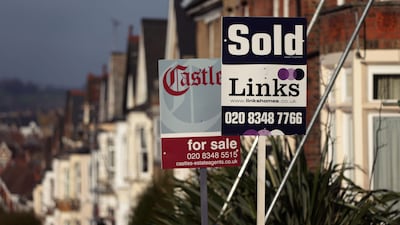The average British house price recorded its fastest growth in 15 years in November taking property values to a record high of £272,992 ($361,765).
House prices rose 8.2 per cent compared with November last year and 1 per cent against October's £270,027, with quarterly house price inflation at its strongest level since 2006, with 3.4 per cent growth, according to the Halifax House Price Index.
“This is the fifth straight month that average house prices have risen, with typical values up by almost £13,000 since June, and more than £20,000 since this time last year,” said Russell Galley, managing director of Halifax.
“Since the onset of the pandemic in March 2020, and the UK first entering lockdown, house prices have risen by £33,816, which equates to £1,691 per month.”
Britain’s property market has continued to rise since the end of the stamp duty holiday on October 1 despite fears that it would stutter once the tax break ended.
Mr Galley said the performance of the market is underpinned by a shortage of available properties, a strong labour market and keen competition among mortgage providers keeping rates close to historic lows.
“Those taking their first step on to the property ladder are also playing an important role in driving activity, with annual house price inflation for first-time buyers at 9.1 per cent compared to 8.8 per cent for home movers,” he said.
This trend is also reflected in different property types, with double-digit annual price inflation for flats of 10.8 per cent over the past year compared with slower gains for detached properties of 6.6 per cent.
“This could suggest the ‘race for space’ is becoming less prominent than it was earlier in the pandemic, with industry data also showing the overall number of completed transactions has fallen back since the end of the stamp duty holiday,” Mr Galley said.
Halifax said the average house price in Wales has passed £200,000 for the first time. Wales also had the strongest annual house price inflation in November, at 14.8 per cent, while Northern Ireland recorded an increase of 10 per cent and Scotland 8.5 per cent
Meanwhile, London continued to lag the rest of UK in its rate of house price growth, with annual inflation of 1.1 per cent.
Looking ahead, Mr Galley said there is now greater uncertainty than has been the case for quite some time, with interest rates expected to rise to guard against further increases in inflation.
“Economic confidence may be also be dented by the emergence of the new Omicron virus variant, though it remains far too early to speculate on any long-term impact, given insufficient data at this stage, not to mention the resilience the housing market has already shown in challenging circumstances," he said.
“Leaving aside the direct impact of a possible resurgence in the pandemic for now, we would not expect the current level of house price growth to be sustained next year given that house price to income ratios are already historically high, and household budgets are only likely to come under greater pressure in the coming months."


